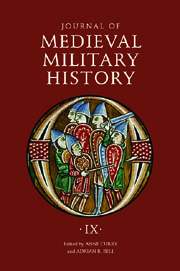Book contents
- Frontmatter
- Contents
- List of Illustrations
- Preface
- The French Offensives of 1404–1407 against Anglo-Gascon Aquitaine
- The King's Welshmen: Welsh Involvement in the Expeditionary Army of 1415
- Gunners, Aides and Archers: The Personnel of the English Ordnance Companies in Normandy in the Fifteenth Century
- Defense, Honor and Community: The Military and Social Bonds of the Dukes of Burgundy and the Flemish Shooting Guilds
- The Battle of Edgecote or Banbury (1469) Through the Eyes of Contemporary Welsh Poets
- Descriptions of Battles in Fifteenth-Century Urban Chronicles: A Comparison of the Siege of London in May 1471 and the Battle of Grandson, 2 March 1476
- Urban Espionage and Counterespionage during the Burgundian Wars (1468–1477)
- Urban Militias, Nobles and Mercenaries: The Organization of the Antwerp Army in the Flemish–Brabantine Revolt of the 1480s
- Military Equipment in the Town of Southampton During the Fourteenth and Fifteenth Centuries
- Journal of Medieval Military History 1477 545X
Defense, Honor and Community: The Military and Social Bonds of the Dukes of Burgundy and the Flemish Shooting Guilds
Published online by Cambridge University Press: 05 February 2013
- Frontmatter
- Contents
- List of Illustrations
- Preface
- The French Offensives of 1404–1407 against Anglo-Gascon Aquitaine
- The King's Welshmen: Welsh Involvement in the Expeditionary Army of 1415
- Gunners, Aides and Archers: The Personnel of the English Ordnance Companies in Normandy in the Fifteenth Century
- Defense, Honor and Community: The Military and Social Bonds of the Dukes of Burgundy and the Flemish Shooting Guilds
- The Battle of Edgecote or Banbury (1469) Through the Eyes of Contemporary Welsh Poets
- Descriptions of Battles in Fifteenth-Century Urban Chronicles: A Comparison of the Siege of London in May 1471 and the Battle of Grandson, 2 March 1476
- Urban Espionage and Counterespionage during the Burgundian Wars (1468–1477)
- Urban Militias, Nobles and Mercenaries: The Organization of the Antwerp Army in the Flemish–Brabantine Revolt of the 1480s
- Military Equipment in the Town of Southampton During the Fourteenth and Fifteenth Centuries
- Journal of Medieval Military History 1477 545X
Summary
Archery and crossbow guilds are first documented in Flanders in the early fourteenth century, and grew from military origins to become some of the leading cultural and festive groups in late medieval towns. Though the shooting guilds of the fifteenth century maintained a military function, and could become soldiers in ducal armies, they had become social and religious guilds and a vibrant part of late medieval urban culture. The guilds, like religious confraternities, had chapels and paid priests for performing services. And, like craft guilds, the shooters held annual meals, strengthening their unity through commensality. The guilds were an important part of regional festive networks, holding competitions across the Low Countries that could last weeks and bring in hundreds of fully armed competitors. A great deal could be said about the civic and local importance of shooting guilds, but rather than attempt such a huge study here, the focus of this paper will be the military and social interaction between the shooting guilds and the dukes of Burgundy.
Shooting guilds were not unique to Flanders; they are documented across northern Europe. Flanders is, however, the most fitting location for a study of the guilds, firstly because of its numerous detailed archives, from the ducal central archives to town archives to private guild archives, and secondly, because of its urbanized nature: as the most urbanized area north of the Alps, a centre of civic culture and powerful economies, Flanders is an obvious choice for the study of any urban group.
- Type
- Chapter
- Information
- Journal of Medieval Military History , pp. 76 - 96Publisher: Boydell & BrewerPrint publication year: 2011



